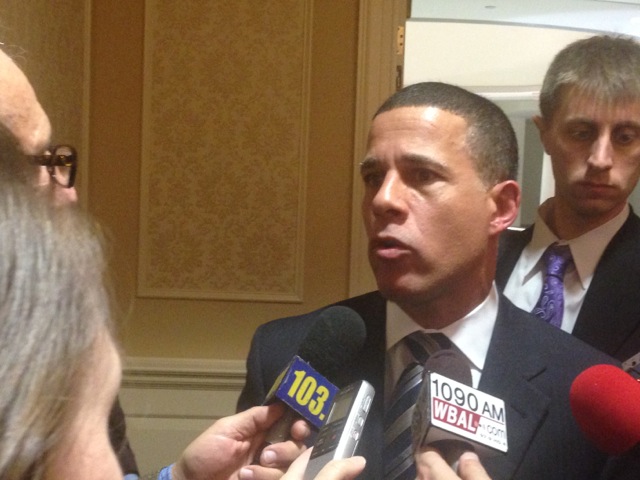ANNAPOLIS – Gubernatorial candidate Lt. Gov. Anthony Brown and his running mate collected more than $328,000 from health care-related donors in 2013, according to a Capital News Service analysis of reports filed this month with the State Board of Elections.
At least $247,318 in donations made to Brown and $81,230 made to Howard County Executive Ken Ulman came from health-related donors, including political action committees, businesses such as insurance carriers, hospitals and medical technology companies, and individuals who reported they are employed by these companies.
Brown, a Democrat, has been the point-person for the state’s flaw-ridden online health insurance exchange.
Contributions made to Brown and Ulman from donors in the medical and health insurance fields have sparked fierce opposition from Republicans.
In response to the Republican opposition, Brown’s Campaign Manager Justin Schall said in an email that these contributions play no role in policy or governing decisions, and that Brown will stay focused on expanding access to health care in the state. The campaign refused to answer further questions on special-interest contributions.
Of the $5.4 million total that Brown and Ulman collected in 2013, $4.1 million were contributions made to Brown and the remaining were made to Ulman. Health care special interest contributions totaled 6 percent of all donations.
Brown and Ulman reported $7 million of cash on hand, leading all other candidates for governor.
Jennifer Bevan-Dangel, executive director of Common Cause Maryland, said that the state should consider making such donations from state-regulated entities to campaigns illegal.
“While [a donation] doesn’t necessarily buy votes, but it buys access and it buys a different influence at the table,” she said. “Whenever you have special interest that is able to make these significant donations to a campaign, it creates a different relationship [and] an unfair playing field.”
Insurance carriers that are offered to residents through the state’s health exchange website and their employees donated at least $10,450 to Brown and $1,877 to Ulman. Aetna also contributed to at least $1,250 the campaign, though it withdrew from the exchange in August, before Marylanders could sign up.
Aetna spokesman Matt Wiggin said despite the withdrawal from the exchange, the company is “still committed to the state.”
In an email Friday, Aetna stated: “We … support organizations and political candidates, both Democrats and Republicans, who share our views on how to address the issues we face. We believe it is important to support organizations and political candidates who work to further our goals and those of the people we serve.”
Excluding contributions from their employees, several businesses contributed as much as $4,000 each, including CareFirst. CareFirst, which is one of four private insurance carriers offered on the website, and its employees led in donations from health exchange insurers. Between its employees and the company itself, CareFirst contributed a total of at least $9,450 to Brown and Ulman combined.
“CareFirst participates in the political process within the region it serves and within the parameters of the law,” the company said in a statement.
Health-driven PACs made up $28,000 and industry individuals donated $138,370 of Brown’s total. Out-of-state donors also contributed $67,923 to Brown, of which $12,000 came from out-of-state PACs such as the Erie Insurance PAC from Erie, Penn., and the American Society of Anesthesiologists PAC out of Park Ridge, Ill.
While companies such as MedStar Health and the University of Maryland Medical System didn’t make contributions to the campaign, individuals who reported employment by these institutions made significant contributions, with MedStar employees racking up a combined total of $15,620, and individuals from the University of Maryland Medical System contributing $13,500.
Brown has received backlash from some Republicans for the contributions, including Attorney General Doug Gansler, who will face Brown in the June Democratic primary.
“The conflict is being in charge of the health care exchange rollout and leveraging that to call these companies to get their money. I think the conflict is very apparent here,” Gansler said. “It’s not like these are people he knows, these are people who stand to benefit from his roll. … You have to have some sort of moral compass when you’re raising money.”
Gubernatorial candidate Delegate Heather Mizeur, D-Takoma Park, has not entered the fray over Brown and Ulman’s donations. Her campaign declined to comment on the issue.

